- Other Names
- Stem cell factor, KIT-ligand, Kitl, KL-1, mast cell grow factor (MGF), steel factor (SF), FPH2, SHEP7
- Ave. Rating
- Submit a Review
- Product Citations
- publications
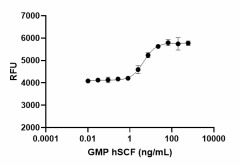
-

GMP recombinant human SCF induces proliferation of TF-1 human erythroleukemic cells in a dose-dependent manner with an ED50 range of 3 - 12 ng/mL.
| Cat # | Size | Price | Quantity Check Availability | Save | ||
|---|---|---|---|---|---|---|
| 573914 | 25 µg | 400€ | ||||
| 573916 | 100 µg | 1308€ | ||||
Stem Cell Factor (SCF) is initially synthesized as membrane-bound forms of 248 or 220 amino acids, depending on alternative splicing of exon 6. The 248 amino acid form contains a proteolytic cleavage site encoded by exon 6, and it is cleaved from the cell to release an active soluble protein of 165 amino acid residues. Soluble SCF is glycosylated at both N-linked and O-linked sites. MMP-9 plays a physiological role in SCF release from the membrane, and this action plays a significant role in differentiating and mobilizing stem and progenitors cells from the bone marrow. SCF increases the proliferation of myeloid and lymphoid hematopoietic progenitors in bone marrow cultures. SCF/c-kit interaction in mast cells results in mast cell degranulation with release of mediators, such as histamine and inflammatory cytokines and chemokines. Also, activation of c-kit in dendritic cells regulates T helper cell differentiation and allergic asthma. In addition, SCF plays an important role in revascularization of ischemic limbs. Ischemia induces plasma elevation of SCF and thrombopoietin (TPO) and, in lower levels, GM-CSF and erythropoietin (EPO). SCF and TPO induce the release of CXCL12 from platelets, thereby increasing CXCL12 levels in plasma. This results in an extensive mobilization of CXCR4+VEGFR1+ cells (hemangiocytes), accelerating revascularization of the ischemic limbs. SCF binds to its receptor kit that belongs to the type III tyrosine kinase family, whose members include receptors for M-CSF and PDGF.
Product DetailsBioLegend Cell-Vive™ GMP Recombinant proteins are manufactured and tested in accordance with USP Chapter 1043, Ancillary Materials for Cell, Gene and Tissue-Engineered Products and Ph. Eur. Chapter 5.2.12 in a dedicated GMP facility compliant with ISO 13485:2016. Specifications and processes include:
- Low endotoxin level (≤ 0.1 EU/μg)
- Purity (≥ 95% or higher)
- Bioburden testing
- Mycoplasma testing
- Batch-to-batch consistency
- Vendor qualification
- Raw material traceability and documentation
- Documented procedures and employee training
- Equipment maintenance and monitoring records
- Lot-specific certificates of analysis
- Quality audits per ISO 13485:2016
- QA review of released products
Product Details
- Source
- Human SCF, amino acids Glu26-Ala189 (Accession# NM_000899.4) was expressed in E. coli.
- Molecular Mass
- The 165 amino acid recombinant protein has a predicted molecular mass of approximately 18.6 kD. The DTT-reduced and non-reduced protein migrate at approximately 20 kD and 18 kD respectively by SDS-PAGE. The N-terminal amino acid is Met.
-
N-terminal
Sequence Analysis - Met-Glu-Gly-Ile-(Cys)-Arg-Asn-Arg-Val-Thr
- Purity
- ≥ 95%, as determined by Coomassie stained SDS-PAGE
- Formulation
- 0.1 µm filtered protein solution is in PBS.
- Endotoxin Level
- Less than or equal to 0.1 EU per µg protein as determined by the LAL method
- Residual Host Cell Protein Content
- ≤ 0.500 ng/µg by ELISA
- Concentration
- 500 µg/mL
- Storage & Handling
- Unopened vial can be stored between 2°C and 8°C for up to 2 weeks, at -20°C for up to six months, or at -70°C or colder until the expiration date. For maximum results, quick spin vial prior to opening. The protein can be aliquoted and stored at -20°C or colder. Stock solutions can also be prepared at 50 - 100 µg/mL in appropriate sterile buffer, carrier protein such as 0.2 - 1% endotoxin-free BSA or HSA can be added when preparing the stock solution. Aliquots can be stored between 2°C and 8°C for up to one week or stored at -20°C or colder for up to 3 months. Avoid repeated freeze/thaw cycles.
- Activity
- ED50 = 3 - 12 ng/mL as determined by its ability to induce proliferation of TF-1 human erythroleukemic cells. Deep Blue Cell Viability™ Kit (Cat. No. 424701) is used to measure the proliferation.
- Application
-
Biossay
Cell Culture - Application Notes
-
BioLegend carrier-free recombinant proteins provided in liquid format are shipped on blue ice. Our comparison testing data indicates that when handled and stored as recommended, the liquid format has equal or better stability and shelf-life compared to commercially available lyophilized proteins after reconstitution. Our liquid proteins are validated in-house to maintain activity after shipping on blue ice and are backed by our 100% satisfaction guarantee. If you have any concerns, contact us at tech@biolegend.com.
- Disclaimer
-
BioLegend Cell-Vive™ GMP Recombinant proteins are for research use only. Suitable for ex vivo cell processing. Not for injection or diagnostic or therapeutic use. Not for resale. BioLegend will not be held responsible for patent infringement or other violations that may occur with the use of our products.
Antigen Details
- Structure
- Homodimer
- Distribution
-
Embryonic Stem Cells, Hematopoietic stem and progenitors
- Function
- Plays an essential role in the regulation of cell survival and proliferation, hematopoiesis, stem cell maintenance, gametogenesis, mast cell development, migration and function, and in melanogenesis.
- Interaction
- Mast cells, natural killer cells, dendritic cells, eosinophils, epithelial cells, endothelial cells, melanocytes, germ cells, cholangiocytes, platelets, myeloid leukemia cells, and intestinal cells of Cajal
- Ligand/Receptor
- c-kit (CD117)
- Bioactivity
- Measured by its ability to induce proliferation of TF-1 human erythroleukemic cells
- Cell Type
- Embryonic Stem Cells, Hematopoietic stem and progenitors
- Biology Area
- Angiogenesis, Cell Biology, Immunology, Signal Transduction, Stem Cells
- Molecular Family
- Cytokines/Chemokines, Growth Factors
- Antigen References
-
- Lu HS, et al. 1996. J. Biol. Chem. 271:11309.
- Heissig B, et al. 2002. Cell 109:625.
- Jin DK, et al. 2006. Nat. Med. 12:557.
- Krishnamoorthy N, et al. 2008. Nat. Med. 14:565.
- Ray P, et al. 2010. Ann. N. Y. Acad. Sci. 1183:104.
- Gene ID
- 4254 View all products for this Gene ID
- UniProt
- View information about SCF on UniProt.org
 Login / Register
Login / Register 












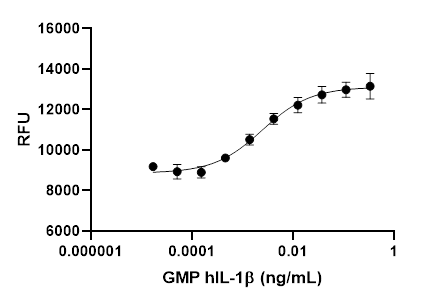
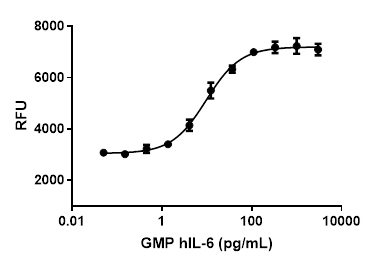
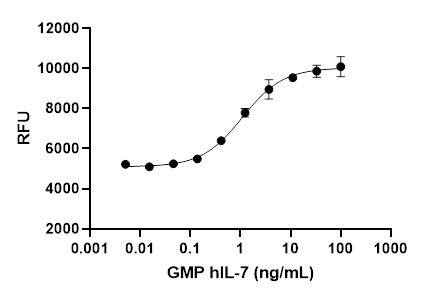
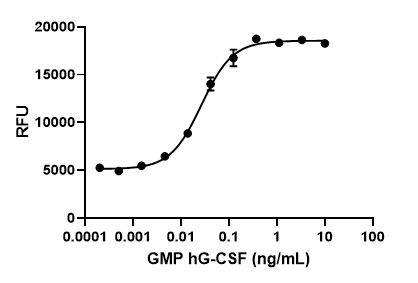



Follow Us